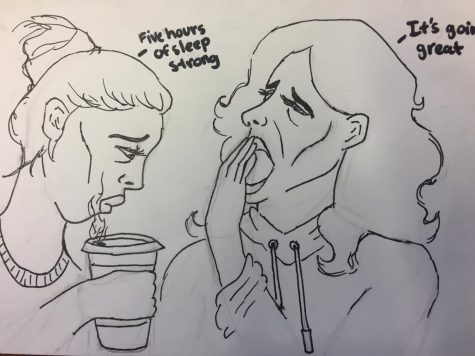The Impatient Patient: Sleep deprivation should not be a high school rite of passage
Getting enough sleep per night should not be a luxury, but a priority
According to a study done by the National Sleep Foundation, a mere 15 percent of high school students in the US are sleeping 8.5 hours per school night, the bare minimum of the recommended 8 to 10 hours. For the 85 percent of us, nights are spent fruitlessly trying to outrun deadlines.
We are all too aware of the detrimental health effects that come with a lack of sleep —- we hear about them in studies made every so often in the news and, most importantly, we are living the effects of a lack of sleep. A lack of sleep comes with a hefty price —- hindered concentration and a risk of heart disease and diabetes, to name a few.

In all honesty, we will never dive deep enough to fish out the reasons — or lack thereof — as to why teens are not getting enough sleep. And while I applaud and very much look forward to Senate Bill 238 that mandates that middle and high schools in California start no earlier than 8:30 a.m., a larger problem still lurks.
The epidemic of sleep deprivation cannot be addressed until we ourselves do do. We have created a culture in which the importance of sleep is understated. We have created a culture in which we have become desensitized to the effects of sleep deprivation happening to us, and the possible effects that we might face.
We have taken sleep deprivation so easily in stride, normalizing it to the point where we find ourselves bragging and comparing how little sleep we get. Why is a student dozing off in class is met with a glare and a sharp tone, but not concern for a deeper issues that must be atoned?
Even if we have later school start times and less homework, or even if we are miraculously gifted a couple more hours in a day, the fact still stands that we have gotten so used to so little sleep that we allow an ongoing cycle to perpetuate in which our body thrives on deprivation, and is in turn fueled by doses of caffeine and energy drinks.
We stay up late, wake up tired, go to school tired and come home tired, crashing on the weekends. While this strategy may help if you have one or two hours in sleep debt, some studies believe that anything more than 20 hours of sleep lost could possibly have irreversible effects.
Our lack of sleep not only affects our scholarly life, but can actually be fatal —- 80,000 drivers fall asleep while driving daily, and the National Highway Traffic Safety Administration cites a figure of 100,00 sleep-related traffic accidents. Lack of sleep not only threatens your current wellbeing, but also your future and even the wellbeing of others. If that is not a cause of concern, I do not know what is.
We are not to blame for the lack of sleep, but we should be afraid of our diminished importance placed on such an essential component of life. Being constantly tired is not normal in the slightest. Let us not become a new generation of sleep-deprived teens, and instead recognize that our body has an inherent need for more sleep.







